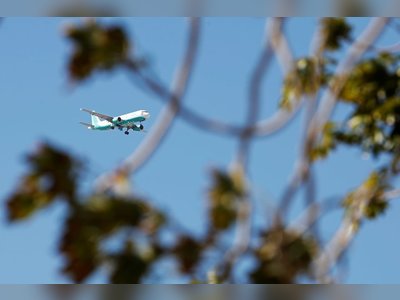
US economy slowed to a 2% rate last quarter in face of COVID
Hampered by rising COVID-19 cases and persistent supply shortages, the U.S. economy slowed sharply to a 2% annual growth rate in the July-September period, the weakest quarterly expansion since the recovery from the pandemic recession began last year.
Thursday’s report from the Commerce Department estimated that the nation’s gross domestic product — its total output of goods and services — declined from robust growth rates of 6.7% in the second quarter and 6.3% in the first quarter, gains that had been fueled by vast infusions of federal rescue aid.
The 2% annual growth last quarter fell below expectations and would have been even weaker if not for an increase in restocking by businesses, which added whatever supplies they could obtain. Such inventory rebuilding added 2.1 percentage points to the quarter’s modest expansion.
By contrast, consumer spending, which fuels about 70% of overall economic activity, slowed to an annual growth rate of just 1.6% after having surged at a 12% rate in the previous quarter.
Economists remain hopeful for a bounce-back in the current October-December period, with confirmed COVID cases declining, vaccination rates rising and more Americans venturing out to spend money. Many economists think GDP will rebound at a solid annual growth rate of at least 4% this quarter.
“The key story right now is the improving health situation,” said Gregory Daco, chief U.S. economist at Oxford Economics. “People are feeling a lot more at ease about moving about.”
Airlines have reported growing passenger traffic, businesses are investing more and wages are increasing as employers struggle to draw more people back into the job market. A resurgence of consumer spending could help energize the economy as the year nears a close.
Growth slows amid COVID, shortages
U.S. gross domestic product increased at an annual rate of 2% in the third quarter of 2021, far below the robust growth enjoyed earlier this year, as ongoing supply shortages and rising coronavirus cases dragged down the economy.
At the same time, though, rising prices, especially for gasoline, food, rent and other staples, are imposing a burden on American consumers and eroding the benefits of higher wages. Inflation has emerged as a threat to the economic recovery and a key concern for the Federal Reserve as it prepares to start withdrawing the emergency aid it provided to the economy after the recession struck last year.
Thursday’s report from the government, the first of three estimates of last quarter’s GDP, showed widespread weakness. In consumer spending, purchases of durable goods, like autos and appliances, fell at a sizable 26.2% rate. Sales of clothing and other nondurable goods slowed to a modest annual gain of 2.6%. And purchases of services rose at a 7.9% rate, down from an 11.5% annual rise in the previous quarter.
Businesses, too, held back. Corporate investment in equipment and plants slowed to a 1.8% rate of growth, after a 9.2% annual increase in the April-June quarter. Residential construction declined at a 7.7% rate after an even sharper 11.7% drop in the previous quarter.
Last quarter, exports declined at a 2.5% annual rate while imports rose at a 6.1% rate — a surge that has contributed to clogged ports. The gap between exports and imports subtracted 1.1 percentage points from last quarter’s annual growth.
Opinion polls have shown that the public is growing increasingly concerned about inflation, a trend that has contributed to a decline in President Joe Biden’s approval ratings. Some economists, including Fed Chair Jerome Powell, have attributed higher inflation mainly to temporary factors, notably bottlenecked supply chains resulting from the speed of the economic recovery. Others say they worry that inflation pressures will prove more chronic.
The inflation data tied to Thursday’s GDP report showed consumer price increases at a still elevated 4.5% annual rate last quarter but down from 6.1% in the second quarter.
Republicans have zeroed in on higher inflation this year to support their charges that Biden’s economic policies aren’t working.
Rep. Kevin Brady of Texas, the top Republican on the Ways and Means Committee, called the new GDP report “awful” and “more proof that President Biden is bungling the recovery.”
Biden and his Democratic allies have been trying to push through Congress two major spending bills — one to upgrade the nation’s infrastructure, the other a social safety net bill that involves climate change, health insurance and child tax credits, among other items. On Thursday, the White House unveiled a $1.75 trillion social safety net proposal, scaled down significantly from an initial $3.5 trillion plan that ran into resistance from Republicans and two key Democratic senators.
The government’s estimate Thursday of GDP growth last quarter was even lower than economists’ forecasts for a significant slowdown. The effects of the delta variant, in keeping some people away from restaurants, retail shops and entertainment venues, was a key drag on growth.
In September, America’s employers added just 194,000 jobs, a second straight sluggish monthly gain and evidence that the pandemic was keeping its grip on the economy, with many companies struggling to fill millions of open jobs.
“The delta wave of the pandemic did a lot of damage — it caused consumer to turn more cautious,” said Mark Zandi, chief economist at Moody’s Analytics. “The virus surge scrambled global supply chains and disrupted production in a lot of industries and also created havoc in the job market.”
But in recent weeks, viral cases have steadily fallen, and many economists say they think the economy is accelerating again. Zandi is predicting 6% annual growth for the current fourth quarter, and some economists foresee an even stronger rebound, depending on whether viral cases continue to fade and supply shortages begin to ease.
For 2021 as a whole, economists generally expect growth to amount to around 5.5%. That would be the highest calendar-year expansion since the mid-1980s and a sharp improvement from the 3.4% plunge in GDP in the recession year of 2020. It would also easily exceed the sub-3% annual economic growth rates that prevailed in the years before the pandemic recession.
The 2% annual growth last quarter fell below expectations and would have been even weaker if not for an increase in restocking by businesses, which added whatever supplies they could obtain. Such inventory rebuilding added 2.1 percentage points to the quarter’s modest expansion.
By contrast, consumer spending, which fuels about 70% of overall economic activity, slowed to an annual growth rate of just 1.6% after having surged at a 12% rate in the previous quarter.
Economists remain hopeful for a bounce-back in the current October-December period, with confirmed COVID cases declining, vaccination rates rising and more Americans venturing out to spend money. Many economists think GDP will rebound at a solid annual growth rate of at least 4% this quarter.
“The key story right now is the improving health situation,” said Gregory Daco, chief U.S. economist at Oxford Economics. “People are feeling a lot more at ease about moving about.”
Airlines have reported growing passenger traffic, businesses are investing more and wages are increasing as employers struggle to draw more people back into the job market. A resurgence of consumer spending could help energize the economy as the year nears a close.
Growth slows amid COVID, shortages
U.S. gross domestic product increased at an annual rate of 2% in the third quarter of 2021, far below the robust growth enjoyed earlier this year, as ongoing supply shortages and rising coronavirus cases dragged down the economy.
At the same time, though, rising prices, especially for gasoline, food, rent and other staples, are imposing a burden on American consumers and eroding the benefits of higher wages. Inflation has emerged as a threat to the economic recovery and a key concern for the Federal Reserve as it prepares to start withdrawing the emergency aid it provided to the economy after the recession struck last year.
Thursday’s report from the government, the first of three estimates of last quarter’s GDP, showed widespread weakness. In consumer spending, purchases of durable goods, like autos and appliances, fell at a sizable 26.2% rate. Sales of clothing and other nondurable goods slowed to a modest annual gain of 2.6%. And purchases of services rose at a 7.9% rate, down from an 11.5% annual rise in the previous quarter.
Businesses, too, held back. Corporate investment in equipment and plants slowed to a 1.8% rate of growth, after a 9.2% annual increase in the April-June quarter. Residential construction declined at a 7.7% rate after an even sharper 11.7% drop in the previous quarter.
Last quarter, exports declined at a 2.5% annual rate while imports rose at a 6.1% rate — a surge that has contributed to clogged ports. The gap between exports and imports subtracted 1.1 percentage points from last quarter’s annual growth.
Opinion polls have shown that the public is growing increasingly concerned about inflation, a trend that has contributed to a decline in President Joe Biden’s approval ratings. Some economists, including Fed Chair Jerome Powell, have attributed higher inflation mainly to temporary factors, notably bottlenecked supply chains resulting from the speed of the economic recovery. Others say they worry that inflation pressures will prove more chronic.
The inflation data tied to Thursday’s GDP report showed consumer price increases at a still elevated 4.5% annual rate last quarter but down from 6.1% in the second quarter.
Republicans have zeroed in on higher inflation this year to support their charges that Biden’s economic policies aren’t working.
Rep. Kevin Brady of Texas, the top Republican on the Ways and Means Committee, called the new GDP report “awful” and “more proof that President Biden is bungling the recovery.”
Biden and his Democratic allies have been trying to push through Congress two major spending bills — one to upgrade the nation’s infrastructure, the other a social safety net bill that involves climate change, health insurance and child tax credits, among other items. On Thursday, the White House unveiled a $1.75 trillion social safety net proposal, scaled down significantly from an initial $3.5 trillion plan that ran into resistance from Republicans and two key Democratic senators.
The government’s estimate Thursday of GDP growth last quarter was even lower than economists’ forecasts for a significant slowdown. The effects of the delta variant, in keeping some people away from restaurants, retail shops and entertainment venues, was a key drag on growth.
In September, America’s employers added just 194,000 jobs, a second straight sluggish monthly gain and evidence that the pandemic was keeping its grip on the economy, with many companies struggling to fill millions of open jobs.
“The delta wave of the pandemic did a lot of damage — it caused consumer to turn more cautious,” said Mark Zandi, chief economist at Moody’s Analytics. “The virus surge scrambled global supply chains and disrupted production in a lot of industries and also created havoc in the job market.”
But in recent weeks, viral cases have steadily fallen, and many economists say they think the economy is accelerating again. Zandi is predicting 6% annual growth for the current fourth quarter, and some economists foresee an even stronger rebound, depending on whether viral cases continue to fade and supply shortages begin to ease.
For 2021 as a whole, economists generally expect growth to amount to around 5.5%. That would be the highest calendar-year expansion since the mid-1980s and a sharp improvement from the 3.4% plunge in GDP in the recession year of 2020. It would also easily exceed the sub-3% annual economic growth rates that prevailed in the years before the pandemic recession.











